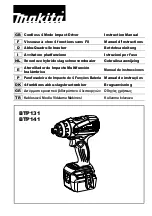
*2282354*
2282354
English
7
▶
Dust produced by grinding, sanding, cutting and drilling can contain
dangerous chemicals. Some examples are: lead or lead-based paints;
brick, concrete and other masonry products, natural stone and other
products containing silicates; certain types of wood, such as oak,
beech and chemically treated wood; asbestos or materials that contain
asbestos. Determine the exposure of the operator and bystanders
by means of the hazard classification of the materials to be worked.
Implement the necessary measures to restrict exposure to a safe level,
for example by the use of a dust collection system or by the wearing
of suitable respiratory protection. The general measures for reducing
exposure include:
▶
working in an area that is well ventilated,
▶
avoidance of prolonged contact with dust,
▶
directing dust away from the face and body,
▶
wearing protective clothing and washing exposed areas of the skin
with water and soap.
▶
Observe the national health and safety requirements.
▶
Do not look directly into the light source (LED) of the product and do not
aim the beam at other persons’ faces. Risk of dazzling or eye damage.
▶
Secure the zone in which you are working and when bringing the product
into position at the workpiece, do not point it toward yourself or other
persons.
▶
Do not activate the impact wrench until after you have brought it into
position at the workpiece.
▶
Comply with national health and safety regulations.
▶
Make sure that the accessory tool is correctly and securely installed.
▶
Risk of injury by falling tools and/or accessories. Before starting work,
check that the battery and installed accessories are secure.
Use of batteries
▶
Do not use the battery as a power source for other unspecified appli-
ances.
2.4 Battery use and care
▶
Comply with the following safety instructions for the safe handling
and use of Li-ion batteries.
Failure to comply can lead to skin irritation,
severe corrosive injury, chemical burns, fire and/or explosion.
▶
Use only batteries that are in perfect working order.
▶
Treat batteries with care in order to avoid damage and prevent leakage
of fluids that are extremely harmful to health!
▶
Do not under any circumstances modify or tamper with batteries!
▶
Do not disassemble, crush or incinerate batteries and do not subject
them to temperatures over 80 °C (176 °F).
Summary of Contents for SIW 6-22
Page 1: ...SIW 6 22 English 1 Français 17 Español 36 Português 55 ...
Page 2: ...1 ...
Page 3: ...2 3 4 5 ...
Page 78: ...74 Português 2282354 2282354 ...
Page 79: ......
Page 80: ...Hilti registered trademark of Hilti Corp Schaan Pos 3 20220113 2282354 2282354 ...












































